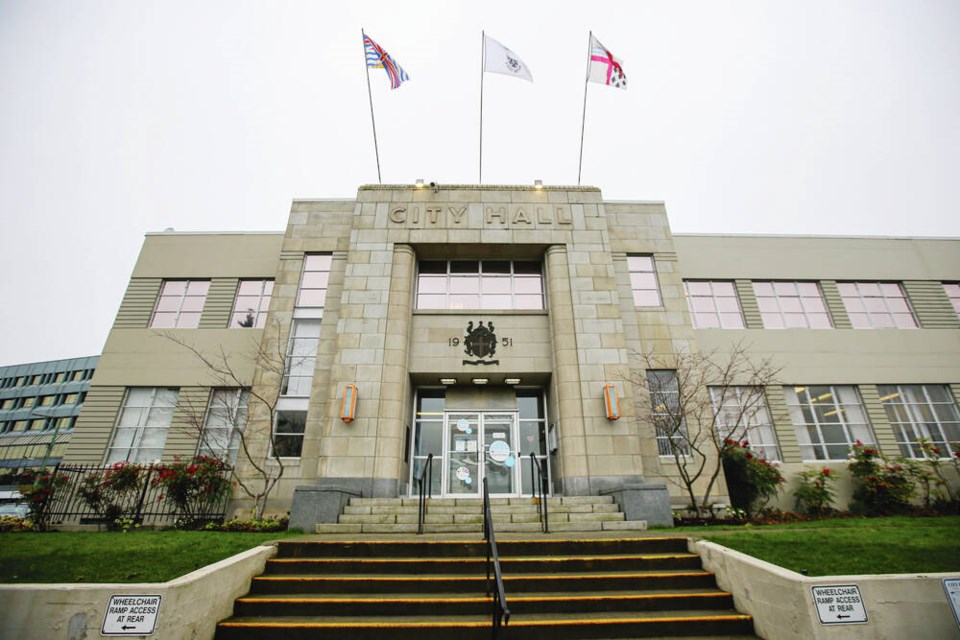The fate of a plan to borrow $48.5 million to upgrade Nanaimo’s aging public-works facilities is once again up in the air, after the alternative approval process hit another snag.
The news comes as the Capital Regional District faces criticism for its own alternative-approval process to borrow $85 million through its land assembly, housing and land banking service to create more housing. That process ended Monday, although the results have not yet been released.
Under alternative approval, at least 10 per cent of eligible voters have to file their opposition to a proposal for it to fail. The onus is on opponents to fill out forms to submit to city hall.
Provincial regulations require elector response forms to be available to electors on the day of the first notice of the process.
In Nanaimo’s latest case, forms were only made available on Jan. 18, eight days after the notice went out.
City hall said in a statement that the current alternative-approval process will carry on until council decides what to do next.
Council agreed Monday afternoon to ask staff to get legal advice and look at options. A special meeting will be held to plan next steps, but no date has been set.
On Tuesday, Mayor Leonard Krog declined to comment “until council has a chance to meet and take advice on it.”
It’s the second time the alternative approval process on the public-works plan has run into a snag. Late last year, the process passed with less than 10 per cent opposition, but was scrapped as a result of an administrative error in advertising.
Some Nanaimo residents felt not enough information was made available on the borrowing proposal.
A statement from the city said staff spotted the latest error late last week.
But Noni Bartlett, spokesperson for the City of Nanaimo Oversight Society, which opposes the alternative-approval process, said Tuesday that her husband, lawyer Sandy Bartlett, was the first to alert staff to shortcomings in the latest process.
He found 15 deficiencies, including the late supply of forms, she said.
He also pointed out to city staff that the form for the January process was similar to the one distributed last fall.
Last year, electors had to state that they had not filled out a similar form in relation to the borrowing bylaw for the public works spending, to ensure each person only expressed their opposition once.
But Nanaimo’s new process used a similar form. That meant those 3,000-plus electors who completed last year’s form could not truthfully say that they had not filled out a form relating to the same borrowing bylaw.
City staff then posted an altered form on Nanaimo’s website to address the issue. But people were confused by the different versions, Noni Bartlett said.
She said that last week, her husband was refused permission by staff and then by the mayor to speak at Monday’s council meeting to point out problems with the process.
Sandy Bartlett then announced he would be outside the Monday meeting at 6:45 p.m. to outline his position.
Shortly before he was to speak, however, the city issued its statement saying the error relating to late forms had been discovered.
Noni Bartlett decried what she called the “wasted expenditure of public funds, as well as the public’s time and energy submitting forms that have no value, not to mention loss of trust in the mayor and council’s administration of our city.”
Her organization opposes the city’s borrowing plans, saying it should instead seismically upgrade the public works yard to improve safety, add more portables to hold new staff and renovate existing buildings.
Bartlett said that if it wants to borrow funds, the city should hold a referendum with polling stations, scrutineers, and notification of all city residents.
The alternative-approval process is also coming under fire in the capital region.
Civic watchdog Grumpy Taxpayer$ has called upon the Capital Regional District to either redo its “flawed’ alternative-approval process or hold a more democratic referendum.
A district staff report on the alternate approval process will go to the CRD board prior to its Feb. 14 meeting and the vote results will be announced, the group said.
“Given the difficulties in the AAP elector response — which have been brought to the attention of the 小蓝视频 Ombudsperson — we have little confidence that the results reflect the broad judgment of residents,” said John Treleaven, chair of Grumpy Taxpayer$.
One of the main complaints about the alternative-approval process was lack of information about the need to spend $85 million on affordable housing, he said.
Five consultant documents prepared for the hospital and housing committee only came to light after the vote closed, but would have helped the public to be better informed, the group said.
“The CRD board should apologize and consider a redo or hold a referendum on what’s an extremely important policy issue deserving widespread discussion,” Treleaven said.
A referendum, he said, would bolster public confidence in the CRD at a time when other major infrastructure investments are on the horizon. “The province must also step up to the plate and ensure every municipality uses the same voting process.”
The organization’s concerns with the alternative process include inadequate public notice, a confusing electoral vote form, inadequate public consultation and vagueness around the use of money.
In Burnaby last year, Mayor Mike Hurley said the city should not use the alternative approval process again after it tried to use it to remove 21 acres of park for industrial use. A public outcry prompted council to cancel the process.
“As long as I’m around here, we will never attempt to use that AAP process again,” Hurley said.
— With a file from Burnaby Now




